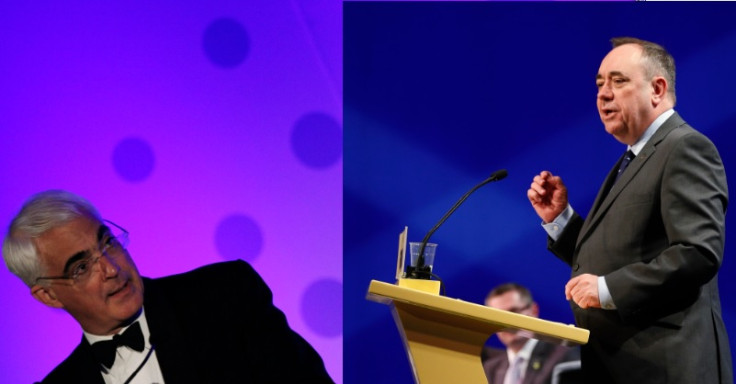Scottish Independence: SNP and UK Treasury Row Over Scotland's Post-Independence Jobs Prospects

Proponents on both sides of the Scottish independence referendum have traded blows on what a 'Yes' vote would mean for Scotland's employment.
The Scottish National Party (SNP) published a 10-point plan stating that it "believes that full employment in an independent Scotland is a realistic goal".
Meanwhile, the UK government issued a report stating that more than one in 10 Scottish jobs are linked to trade with the rest of the UK, with the implication being that these could be impacted should Scots vote to secede from the union.
The Treasury's analysis, which draws on academic research from the University of Strathclyde, found that 267,000 Scottish jobs are "in danger" and are linked to the £51bn bilateral export trade between Scotland and the rest of the UK.
"The economic evidence shows that a borderless UK is a key part of Scotland's economic success. The analysis demonstrates how important the UK's fully integrated single market is for the security of jobs and livelihoods in Scotland," the report says.
The £51bn is more than twice the amount of exports Scotland has with the rest of the world.
In a speech to Better Together campaigners today, the Scottish Liberal Democrat leader Willie Rennie is expected to say:
"These jobs wouldn't go on day one of independence, but they would be in danger even before that. The sheer numbers show how connected we are as a family of nations and how much we support each other to grow.
"The combination of the ability of people in Scotland and the opportunity that the United Kingdom presents means we can record such progress then hope and believe we can achieve more. I'm not going to put over 250,000 jobs at risk; bring investment in renewables shuddering to a halt; see our universities' research stall. If Alex Salmond thinks I'm going to lie down whilst he puts all of these things on the line then he can think again."
The SNP report, however, contradicts the claims made by the Treasury. It states that an independent Scottish government would be confident of providing full employment.
The cornerstones of its plans to boost employment will be galvanising productivity, encouraging innovation and "re-industrialising Scotland for the 21<sup>st Century".
"Scottish Government analysis estimates that boosting labour productivity in Scotland by just 1% could increase output by approximately 1.7% (£2.1 billion) and raise employment by over 21,000 over the long-term (around 20 years). The competitiveness effects and boosts to the tax base could increase tax revenues by around 1.5% which can be recycled back into the economy through increased government spending," wrote the authors.
The SNP pledged to establish a Scottish Business Development Bank, which would "improve access to finance, including for innovative companies".
In his foreword to the report, the Scottish Finance Minister John Swinney said that increased tax-collecting powers would also help boost employment.
"Controlling the tax system to provide incentives for companies to base their operations and headquarters in Scotland and create jobs. A 3% cut in the headline corporation tax rate, in part to resist the gravitational pull of London, could boost employment by 27,000 jobs," he wrote.
The latest independence referendum poll found that the 'No' campaign's lead had fallen to a record low. The survey, conducted through the Commonwealth Games, found that 46% of the electorate plan to vote 'no', with 38% planning to cast a vote for 'yes'. The number of undecided voters also reached a record low of 16%, the Scotsman reports.
Scotland's future will be decided when voters head to the polls on September 18.
© Copyright IBTimes 2025. All rights reserved.






















